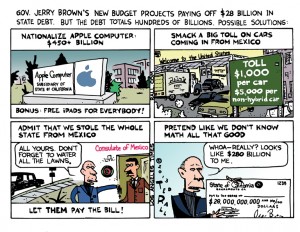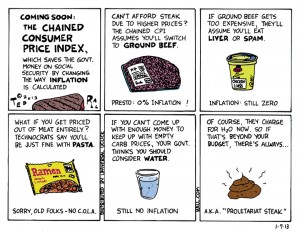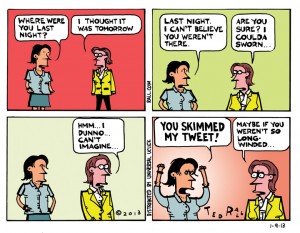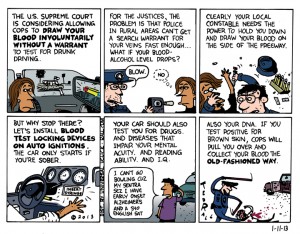Ted Rall: The following is a new blog post by my friend, the cartoonist Matt Bors. Truth be told – and the truth has been suppressed for years – editorial cartooning in the United States has been swimming in a rank cesspool of corruption for decades. Starting in the 1960s, when the brilliant Chicago Tribune cartoonist Jeff MacNelly came to prominence and was quickly and slavishly mimicked in tone and art style by scores of wannabes, continuing in the 1970s and 1980s when gag cartoons making fun of politicians without making any kind of political point replaced serious commentary, into the 1990s and 2000’s when my new, hard-hitting generation of alternative editorial cartoonists made a mark in the alternative newsweeklies but couldn’t revolutionize the profession because we were locked by the McNelly clones, and incestuous art form turned moribund, ossified and corrupt. In my view, copying another artist’s style is a terrible form of plagiarism. So is self-plagiarism: the practice of cutting and pasting an old cartoon and changing a couple of details to create a “new” cartoon. But some of these guys are so lame and untalented that they have actually resorted to a form of plagiarism nobody can possibly call anything other than vile: Photoshopping and or light-tabling another artist’s work. Please read Matt’s post and click on the links to the cartoons to understand the gravity of this situation. Then consider the fact that the cartoonists involved have won many of the top prizes in the field, collected millions of dollars in salaries, and held some of the most prestigious jobs in American newspaperdom – opportunities that have been denied to people like Matt Bors and myself.
Crime pays. Who would you rather be – a famous guy who gets disgraced, or someone who never gets to be famous in the first place?
Why Does Plagiarism in Editorial Cartooning Persist?
by Matt Bors
Editorial cartoonist Bill Day hit his fundraising goal on the crowd funding site Indiegogo this week: $35,000 to keep drawing editorial cartoons for a year. Day is syndicated through Cagle and, like the rest of us, can’t make a full time living with the rates we are paid. Since he lost his staff position a few years ago, Day has been drawing cartoons part time while working odd jobs and Daryl Cagle launched this campaign in order to keep him drawing. Problem is, Day doesn’t do as much drawing as he used to.
 Earlier this week Daily Cartoonist posted a recent cartoon where Day pulled an image of a gun created by Zack Fowler and used it without permission. Once caught, he swapped the cartoon out with a version he drew, but you can see from the comments on the post that neither Fowler nor the papers who pay to run Day’s work knew about this until Alan Gardner’s post. Day hasn’t even bothered to issue a response to Gardner, his silence being almost more damning than the evidence in front of our face.
Earlier this week Daily Cartoonist posted a recent cartoon where Day pulled an image of a gun created by Zack Fowler and used it without permission. Once caught, he swapped the cartoon out with a version he drew, but you can see from the comments on the post that neither Fowler nor the papers who pay to run Day’s work knew about this until Alan Gardner’s post. Day hasn’t even bothered to issue a response to Gardner, his silence being almost more damning than the evidence in front of our face.
Then there is the anonymously written Tumblr account, That Cartoon Critic, which shows repeated instances of Day re-using his cartoons to such an extent that it’s jaw-dropping. Creating new work every day, week in and week out, is difficult, but not plagiarizing others or constantly reissuing old cartoons is not. It’s time for cartoonists and syndicates to stop aiding this.
To be clear, I’m not talking about people who may have drawn similar jokes and had an overlap of ideas with another cartoonist. We’re talking plagiarism, using another person’s art without permission, and literally tracing another cartoonist’s work. We’re also talking about reissuing your own work constantly while presenting it as something new. It’s happened enough now to constitute not an anomaly, but an actual thing that’s wrong with the field. Is it wrong to “self-plagiarize”? Most certainly. Let’s hear what Bill Day has to say about it:
Plagiarism, the practice of taking someone else’s work or ideas and passing them off as one’s own, and its ancillary self-plagiarism, in which individuals republish work that they have already published, represent significant challenges to scientific journals. Authors have a right to be acknowledged as the source of their own work, and new authors must present their work in their own words.
That’s not our Bill Day, the cartoonist, rather Bill Day the editor of Biosystems Engineering speaking about a plagiarism controversy in scientific journals. Perhaps the cartoonist Bill Day can allow himself to absorb some of the other Bill Day’s wisdom.
Cartoonists are sometimes loathe to publicize anything that shines a negative light on our dwindling field. But if we want negative stories to stop, we have to stop supporting people we know are doing terribly unethical work. The fault resides first and foremost with the artist, but syndicates and editors who hold up this kind of work are also to blame. There’s no reason Daryl Cagle should be putting forth Bill Day as a cartoonist to “save” with internet donations when he can’t meet a minimum level of professionalism. I’ll even say this about my own syndicate, Universal Uclick, who continues to syndicate Jeff Stahler’s work after he lost his job for plagiarizing recently after multiple instances dogged him for years. They should stop.
 During my years criticizing lazy and unethical cartooning habits, I compiled a number of examples that, for whatever reason, other cartoonists weren’t willing to publish or even forward in an email. They would send them to me and I tried unsuccessfully for over a year to get someone more prominent than myself to publish them, as I have lots of other things to attend to than being the poster boy for speaking out about these kind of lapses. But many of my peers won’t so much as link to a plagiarism story when it’s published, content to merely complain privately over beers about people who in some cases survived their entire careers while blatantly swiping the work of others. The result is that many cartoonists haven’t even had to so much as publicly explain why their cartoons look so awfully similar to something else, and many editors are unaware it even happens.
During my years criticizing lazy and unethical cartooning habits, I compiled a number of examples that, for whatever reason, other cartoonists weren’t willing to publish or even forward in an email. They would send them to me and I tried unsuccessfully for over a year to get someone more prominent than myself to publish them, as I have lots of other things to attend to than being the poster boy for speaking out about these kind of lapses. But many of my peers won’t so much as link to a plagiarism story when it’s published, content to merely complain privately over beers about people who in some cases survived their entire careers while blatantly swiping the work of others. The result is that many cartoonists haven’t even had to so much as publicly explain why their cartoons look so awfully similar to something else, and many editors are unaware it even happens.
I made a decision yesterday to publish these myself on Twitter because to hold on to them any longer would feel like I’m actively covering for some of these guys. I discovered none of these myself, having received them all from other cartoonists and editors, sometimes anonymously. You can decide for yourself what you think. But here they are. I’m done hanging on to them.
Here is another example of Jeff Stahler straight up tracing and flipping a Mike Lester drawing. It was never published around the time of his most recent plagiarism scandal and was sent to me by an anonymous syndicate editor fed up with seeing his rampant stealing.
Here is another example of Bill Schorr swiping from MacNelly closely enough that it appears traced.
Finally, here is Pulitzer Prize winner Jim Borgman with some cartoons that look so similar to MacNelly’s that they are clearly swiped. Why swipe when you can draw well on your own? No clue. I’m told he was confronted by some cartoonists regarding the similarity and even came up with an excuse – but not publicly of course. Nothing has been written about it until now and I don’t think his editors were even made aware of the charges.
Again, I post these because I can’t hang on to them any longer without feeling dirty. Too much of this debate takes place behind a giant wall hidden from editors and the public. Talking about all this in the open? That’s an idea more cartoonists should copy.
(C) 2013 Matt Bors, All Rights Reserved, Reposted with Permission.
Ted Rall: Cartooning is like, or should be like, a guild. We are all dependent on the reputation not only of our own individual brands, but also of the field as a whole. Editors currently have a dim view of cartoonists, and this sort of hack work is part of the reason. That takes money out of our pockets. If you are a cartoonist, please consider posting about this to your own blog. You don’t have to necessarily come out in favor of or against Bill Day or any other cartoonist. Just mention it. This is a rare opportunity for our field to examine itself and begin a conversation and a discussion that should have started years ago. The worst thing that could possibly happen would be for this story to go away.








